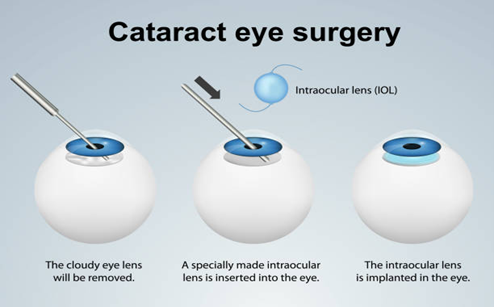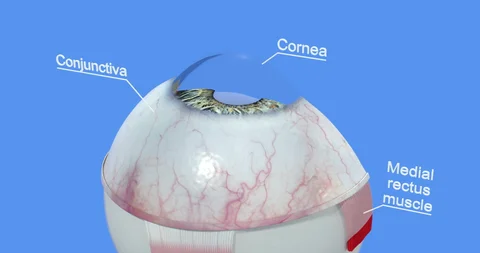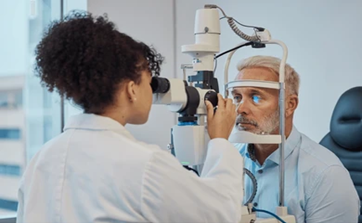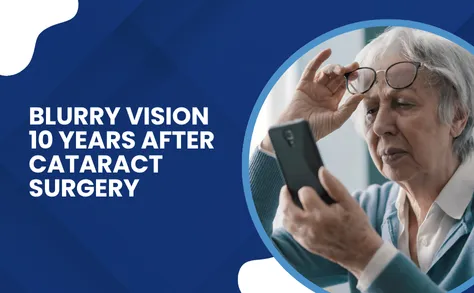Cataract surgery stands among the most frequent and successful operations for restoring vision. Due to technological advances and the hands of accomplished surgeons, numerous patients achieve clear vision for years. Nevertheless, some patients start experiencing visual disturbances—such as bluriness—even a decade later. This issue is more prevalent than one would imagine.
Dr. Tanvi Shah, ophthalmologist in Lalbaug, Mumbai, explains, “Blurry vision after a decade of cataract surgery can often be attributed to secondary conditions that are treatable. Patients shouldn’t panic but should definitely seek evaluation.”
With a reputation for attention to detail and more than 8 years of experience, Dr. Tanvi Shah is a specialist in state-of-the-art vision correction surgeries. She is one of the best laser cataract surgeons in Lalbaug, famous for precision, patient care, and latest treatment techniques that keep people having clear vision years after the first procedure. If you have blurry vision 10 years after cataract surgery, her skill brings clarity and guidance.
Is It Normal to Experience Blurry Vision a Decade After Cataract Surgery?
Blurry vision 10 years after cataract surgery is not entirely rare. The initial surgery itself is permanent—you get your natural lens replaced with an artificial intraocular lens (IOL). There may be other alterations in the eye or complications developed over time, though. Factors such as aging, secondary cataracts, or other conditions unrelated to the eye can disrupt your clear vision.

What Are the Common Causes of Blurred Vision Years After Cataract Surgery?

- Posterior Capsule Opacification (PCO)
Often termed a “secondary cataract,” it’s the most common cause of blurry vision post-surgery.
- Dry Eye Syndrome
Long-term dryness or tear film instability can reduce clarity.
- Macular Degeneration
Age-related deterioration of the retina’s central area can affect sharpness.
- Diabetic Retinopathy
Common in patients with diabetes, impacting retinal blood vessels.
- Retinal Detachment or Tears
Though rare, these severe conditions can blur vision and need immediate attention.
- Epiretinal Membrane (ERM)
Scar tissue on the retina causing distortion.
- Glaucoma
Gradual optic nerve damage can present with peripheral and eventually central vision issues.
- Incorrect IOL Positioning
Lens shifting over a period of time, though rare, is responsible for blur.
- Cystoid Macular Edema (CME)
Swelling in the central retina due to fluid accumulation.
Heard of a “secondary cataract” but not sure what it means? Let’s explore the details of PCO and how it affects sight.
Understanding Posterior Capsule Opacification (PCO) and Its Impact on Vision
Posterior Capsule Opacification (PCO) is the most frequent cause of blurry vision following cataract surgery. It occurs when the thin membrane holding your new intraocular lens becomes cloudy.
This clouding interferes with light passing through to the retina, resulting in symptoms similar to the original cataract.

This condition doesn’t mean your cataract has returned—it’s a secondary clouding that mimics original cataract symptoms, including blurry vision, glare, and difficulty seeing clearly in bright light. PCO can develop months or even years after surgery, and it’s treatable with a painless laser procedure called YAG laser capsulotomy. It is a simple outpatient laser procedure that can quickly restore clarity by creating a clear opening in the opacified capsule. It’s painless, takes only a few minutes, and typically provides noticeable improvement almost immediately.
How Is Long-Term Blurry Vision Treated After Cataract Surgery?
The treatment of blurry vision years following cataract surgery is based on its exact cause. There are a number of efficient solutions, from uncomplicated outpatient procedures to specific medical therapies:
- YAG Laser Capsulotomy
This brief laser procedure removes posterior capsule opacification and is usually the initial solution to post-surgical blur.
- Prescription Adjustments
Changes in vision over time can necessitate new glasses or contact lenses to maximize focus.
- Dry Eye Management
Artificial tears, warm compresses, or prescription eye drops can improve tear quality and reduce blurriness.
- Anti-VEGF Injections
They are employed for the management of macular degeneration or diabetic retinopathy by reducing abnormal blood vessel growth.
- Vitrectomy
Surgery to eliminate vitreous opacities such as floaters or membranes impairing retinal function.
- Retinal Surgery
In retinal detachment, tears, or severe retinal disease, surgery to restore or preserve vision may be required. Procedures such as scleral buckling or vitrectomy with laser therapy are individually suited to the condition.
- Topical NSAIDs or Steroids
These drugs reduce inflammation and swelling due to cystoid macular edema.
- Lifestyle Modifications
Management of underlying conditions such as diabetes, limiting screen usage, and shielding eyes from sunlight can keep the vision clear.
Can Other Eye Conditions Develop Years After a Successful Cataract Procedure?
Even after a successful cataract procedure, your eyes continue to age, and with age comes the possibility of new vision challenges. Conditions such as macular degeneration, glaucoma, and diabetic retinopathy may develop independently of the surgery and gradually affect vision over time.
These conditions are not directly related to the cataract procedure itself, but rather highlight the importance of ongoing eye care. With regular monitoring and early intervention, many of these problems can be managed before they significantly impair your sight. Staying proactive with eye health can ensure that your vision remains clear and stable well into the future.
When Should You Consult Your Ophthalmologist About Changes in Vision?
Some visual changes may seem harmless at first, but they could be early warning signs of more serious issues. Here’s when it’s essential to seek professional guidance:
- Sudden Blurriness – This could be a sign of retinal issues or macular edema.
- Light Sensitivity or Halos – These signs can indicate PCO, dry eye syndrome, or early glaucoma.

- Visual Distortion – A possible sign of epiretinal membrane or macular degeneration.
- Flashes or Floaters – May indicate vitreous changes or retinal detachment and must be handled right away.
- Diminished Night Vision – Often related to retinal aging or secondary cataract.
- Eye Pain or Redness – May suggest inflammation, infection, or elevated eye pressure.
Prompt consultation can make all the difference in preserving vision and catching issues early.
The Bottom Line: Blurry Vision Years Later Isn't Unusual—But It's Manageable
Experiencing blurry vision 10 years after cataract surgery can be concerning, but it’s not uncommon or untreatable. With a timely diagnosis and expert treatment from a competent specialist like Dr. Tanvi Shah, most patients regain clarity and continue to enjoy healthy vision. Whether it’s a secondary cataract, retinal condition, or simply age-related vision changes, proven solutions are available, and prompt action leads to better visual outcomes.
Frequently Asked Questions
Is it common to get a "secondary cataract" years after surgery?
Does blurry vision always mean PCO?
What's the risk of retinal issues long after cataract surgery?
Should I have routine eye exams after cataract surgery?
What causes blurry vision in one eye after cataract surgery?
How long after cataract surgery is vision blurry?
Reference links:
https://www.medicalnewstoday.com/articles/blurred-vision-2-years-after-cataract-surgery
https://www.eduardobessermd.com/blog/reasons-for-blurry-vision-after-cataract-surgery
Disclaimer: The information shared in this content is for educational purposes and not for promotional use.

